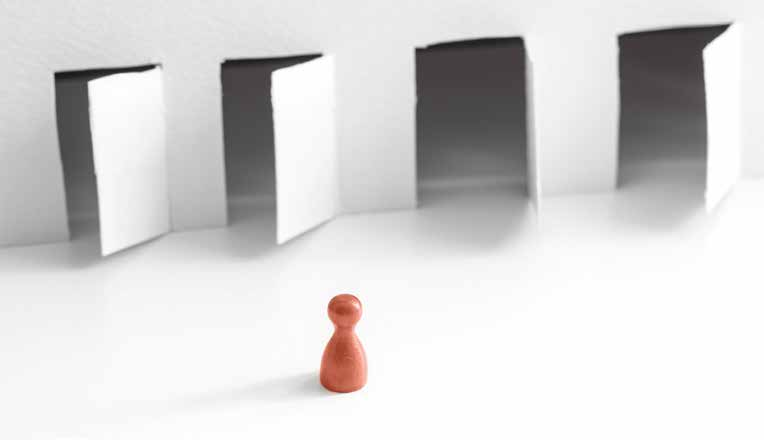

A Donor’s Dilemma
Knowledge 14 December 2018 Tomasz Wiśniewski 0

Helping those in need of a business enterprise is an element of good PR – looks good, adds prestige, and clears the company’s conscience. Should we always help? When can help do more harm than good?
How do we choose a beneficiary, and is it possible to help without spending a dime?
There is a certain unwritten rule that states that youshould dedicate a certain percentage of your income to charity. But what if you yourself are barely making it? The key word here is “income”. I believe it is best to hold off on helping others until you yourself are out of debt and start having a real income. It might be the case that this will allow you to be able to help others more quickly and in a more realistic way. Remember, to effectively help others, you first must help yourself. Eventually, instead of financial assistance, you can break away from your daily business routine to: paint a clinic, plant a forest, or renovate dog houses
– in other words providing non-material help.
When you are ready to help, it may turn out that it really is not that easy to choose a beneficiary. I took months to find mine; and I learned that we get most excited about campaigns that have an immediate effect and the message is simple – “Donate or someone may die”. I spoke to ecological organisations, which recommended against systemic campaigns concentrated on protecting the air in our nation. They would rather organise fund raisers for dying children in a far off war- torn nation.
Why?
Because for the last 10 years we are told that we have the most polluted air in Europe, which results in 45 thousand deaths every year, but nobody cares about this. It’s not the first time we would rather cure than prevent. I tried to give support to a dog shelter as well – again systematically, so they would never again have problems with paying their electric bill. The idea was to raise the funds in the form of stocks in a wind based power plant, which would then generate the finances needed to cover the electrical costs of the shelter. Evidently, they would rather react to crisis, asking for donations to be deposited into the account of the electrical company every time the power is cut off. Very similarly to another foundation I accidentally encountered, to which I offered my help to and requested they contact me because they didn’t have a business card – I am still waiting for them to call me.

Impulsive helping can cause more harm than good. There are people who thanks to the help they get from passers-by on the street, will forever remain on the street. When a healthy man with to good arms and two good legs asks me to pocket change in return for watching after my car, I start to think how many disabled individuals achieve the unthinkable in dancing, sprinting, and varied other areas
While gathering my thoughts for this article, I noticed a post from a friend on Facebook, who wrote that while in Gambia she came to realise that what we call help is only cleansing our own conscience. White tourists often give children candy, notebooks, pens, crayons, etc. From an early age, they are taught bad habits. We teach them that they don’t have to do anything – white people will come and give it to us. If we need wells and medicines, white people will provide it for us.
Visitors to Africa are usually a bit better off than most. We spend more when on vacation than usual, and with this action show that money is abundant in Europe. In many African nations, people are taught since early childhood that white people will give them what they need. So why are we so surprised that when they come to Europe they still think like this? We complain about them and talk about how horrible they act, when the truth is, we make them this way…
In his book “How I Became a Millionaire” John M. Fijor writes that Poles emigrated to Canada and Australia because the local governments assured them they would be provided material assistance, language education, and even temporary housing. The American government on the other hand couldn’t care less, and therefore now, a quarter- century later, the Polish community in Australia is still dependent on social security. They got used to it and so it continued. The American system is merciless, painful, and yet better. No assistance, just dive right in and manage. And that is why every sixth Polish immigrant in America is a millionaire.
The fear of failure, fear of hunger, lots of freedom in choosing your own destiny; all force a person to squeeze out every bit of strength in them which, in other circumstances, they would never know they had. This was the exact thing that convinced me to quit my job and jump into the deep end of entrepreneurship in our Polish economy.
I’m sure many people wonder, since the government takes nearly half their income in the form of taxes, and they pay more than PLN 1,000 to ZUS every month without ever using the public healthcare system, whether they still have to support WOŚP [The Great Orchestra of Christmas Charity], Szlachetna Paczka [the Noble Package] and a slew of other government initiatives. After all, those in need already use that money which was collected by these foundations to buy packaged products and services, which, in turn, are again taxed. The problem is, that based on our own observations, most of the money collected by the government is utilised improperly. It would be great if we could deduct charitable donations from our taxes, but in accordance with the rule of “Poles can do it”, this law which once existed in Poland was abused to avoid paying taxes. So, what is left to be dedicated toward charitable causes, is hard earned money after taxes.
As is self-evident, it’s not easy to help, or even chose a beneficiary. Therefore, we usually choose a brand which we trust and can combine 2 in 1.
A while ago, I liked the idea of buying water from a manufacturer who supported planting trees. If a client has a lot of different brands of water within a similar price range to choose from, then there is a good chance they will choose the one which supports a cause they identify Research shows that 94% of people buy products which are environmentally friendly. This is not the case only when it comes to products with a very low individual price. From my experience, even when dealing with investments, an investor who has the same level of risk and return involved will invest in the product which is environmentally friendly. Instead of financial engineering where money is simply transferred from one hand to the next, many investors prefer putting their money into renewable energy, which provides both a good return and a solution to social problems of our nation.
Investing in Renewable energy allows us to protect the environment and cleanse our air; it provides security for future generations to retire to, raises the GNP and thus helps revitalise the economy, frees the nation from dependency on foreign coal and fossil fuels, and increases the liberty of individual citizens. If an investor additionally receives a certificate stating they are a company supporting the environment, we have a good complete PR package and at the same time the dilemma of donating is thus solved.








No comments so far.
Be first to leave comment below.
Warning: Undefined variable $user_id in /businessmantoday.us/wp-content/plugins/simple-user-avatar/public/class-sua-public.php on line 86